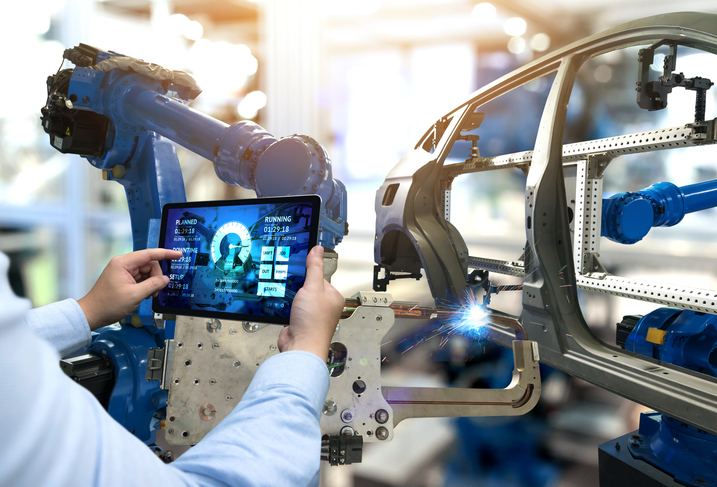The integration of artificial intelligence (AI) with enterprise resource planning (ERP) systems allows manufacturing and distribution companies to gain a competitive edge across a wide variety of challenges and competitors through AI-powered ERP systems. Combining the power of both AI and ERP software gives your organization the ability to enhance operational efficiency, streamline processes and drive growth.
In this comprehensive article, we will explore:
- The rise of AI systems in ERP software
- The key AI technologies in ERP software
- Benefits of AI integration in ERP software

Solving Manufacturing Challenges with Smart Factory-Ready ERP Systems
Discover how ERP systems with smart factory integrated technology help companies overcome common manufacturing challenges.
Exploring the Rise of AI in ERP Systems
Artificial Intelligence has emerged as a transformative technology across various industries, revolutionizing the way businesses operate and make data-driven decisions. To enhance the capabilities of traditional ERP systems, AI-powered ERP systems take advantage of technologies, such as:
- Machine learning
- Natural language processing
- Robotic process automation
- Computer vision
Predictive analytics
The infusion of AI technology allows ERP software to analyze vast amounts of data, automate routine tasks, optimize inventory levels and provide your organization with real-time data and insights. This allows you to make informed decisions, improve productivity and achieve greater operational efficiency.
"The market size of AI in the manufacturing sector is expected to exceed USD 2 billion by 2025, posting average annual growth of more than 40 percent from 2019."
Deloitte
Benefits of AI Integration in ERP Systems
Data management within ERP solutions has been greatly revolutionized by AI-driven capabilities, such as predictive analytics, machine learning and natural language processing. The following are the key benefits that these systems offer:
1. Automation and Efficiency
AI helps automate repetitive, time-consuming tasks, such as processing invoices, managing accounts payable/receivable, fielding customer service requests or reconciling financial data. Technologies, such as machine learning, natural language processing and robotic process automation help AI-powered enterprise resource planning systems handle these routine tasks automatically. This frees up employee time for more strategic initiatives that deliver greater business value
AI integration also enables predictive analytics from historical data, allowing ERP systems to forecast upcoming resource needs, budget requirements and project risks. These AI-powered insights help your organization optimize resource allocation, reduce costs and improve overall efficiency of your business processes. According to research by McKinsey, AI automation in ERP environments can reduce operating costs by up to 25%.
2. Process Optimization
While traditional ERP solutions have predefined processes, AI integration allows for flexible process implementation that adapts to changing conditions. For example, AI can analyze supply and demand patterns and then suggest adjustments to production schedules, business processes or inventory policies to minimize costs and waste. It can also detect inefficiencies in workflows and propose process changes to improve cycle times. This nimbleness and optimization of AI in ERP systems is not possible in legacy ERP platforms.
3. Personalization
AI integration also provides personalized experiences for ERP users through an understanding of individual preferences and behaviors by analyzing the user’s role, past data interactions and common workflows to deliver tailored interfaces and information to each employee.
For instance, with AI in ERP, an accounts receivable manager may get prompts for overdue customer invoices and payment reminder alerts, while a salesperson could get notifications about inventory shortages for key products. These personalized recommendations and notifications increase individual productivity.

4. Enhanced Security
With the growing threat of data breaches, AI in ERP systems also plays a key role in reinforcing ERP system security. An AI-powered ERP system’s algorithms can detect anomalies and patterns that may indicate a security attack or unauthorized access attempt. AI-powered cybersecurity enables preemptive threat identification and prevention for ERP platforms.
According to Capgemini, 60% of organizations say AI improves their ability to respond to cybersecurity threats.4 AI integration empowers ERP systems with capabilities, such as user behavior analytics, credentials analysis and predictive risk monitoring to enhance security.
5. Supply Chain Optimization
ERP systems with AI capabilities allow your organization to optimize complex supply chain operations through accurate demand forecasting, precise inventory management and predictive maintenance.
For example, machine learning algorithms can analyze past sales data, customer behaviors and industry trends to accurately forecast demand across product lines, allowing your organization to optimize inventory levels, avoid shortages or overstocking and improve product availability.
6. Data Analysis and Insights
In today’s data-driven economy, businesses generate an unprecedented amount of data from various sources. However, the true value of this data lies in the insights and trends that can be extracted from it.
AI integration in ERP systems empowers your organization to analyze vast datasets quickly and accurately, enabling you to uncover patterns, identify trends and make informed predictions.
AI algorithms can process and analyze data at an astonishing pace, far exceeding the capabilities of human analysts. Leveraging AI-powered data analytics allows your company to gain a comprehensive understanding of operations, supply chain, customer behavior and market dynamics. This level of insight from AI in ERP systems can inform strategic planning, optimize resource allocation and drive data-driven decision-making.
Learn more about Ultra's consulting services.
Click the button below to request your free discovery call.

7. Cost Savings
One of the most compelling advantages of AI-powered ERP solutions is the potential for cost savings. Your organization significantly reduces operational costs by automating repetitive tasks, streamlining workflows and optimizing resource allocation.
8. Improved Decision-Making
In today’s dynamic business environment, decision-makers often face complex scenarios with numerous variables to consider. AI-powered decision support tools in ERP systems can provide invaluable assistance by analyzing these intricate situations and recommending optimal courses of action.
9. Risk Management
Risk management is a critical aspect of business operations, and AI integration in ERP systems play a significant role in identifying and mitigating potential risks before they escalate. Integrating AI technology such as AI-powered analytics can let you assess and predict risks by analyzing data and detecting abnormal patterns or anomalies. This proactive approach to risk management enhances security measures, improves resilience and enables your organization to respond effectively to dynamic business conditions.
“When our customers have questions about products, orders or shipments, the process for retrieving the information can be tedious and may include making calls to other departments to track down the status. AI-powered ERP solutions available to the customer service agent could provide quick answers to questions presented with natural language. The result would be a positive customer experience and increased productivity for the customer service team.”
Kenny Mullican, Paragon Films
Ready to start your digital transformation journey?
Click the button below to request your free discovery call.

10. Customer Engagement
11. Continuous Improvement
One of the most exciting aspects of AI integration in ERP systems is its ability to support continuous improvement within your organization. ERP systems with AI capabilities can analyze performance data and user interactions, allowing you to identify areas for optimization, automate processes and provide insights for ongoing enhancements.
Conclusion
The integration of artificial intelligence (AI) in enterprise resource planning (ERP) systems has the potential to revolutionize modern business operations. Harnessing the power of AI technologies such as machine learning, natural language processing and computer vision allows your organization to achieve greater operational efficiency, streamline processes and make data-driven decisions.
AI-enabled ERP systems offer several benefits, including improved decision-making, enhanced automation, personalized customer experiences, predictive maintenance and optimized supply chain management. These benefits enable your organization to gain a competitive edge, drive growth and navigate the challenges of the digital age.
Table of Contents
More ERP material...
Choosing a CRM System for Your Business
Data analytics holds the ability to highlight inefficient manufacturing processes and enable…
The Undeniable Benefits of Implementing ERP in Food and Beverage Manufacturing
Data analytics holds the ability to highlight inefficient manufacturing processes and enable…
Emerging Technologies in Manufacturing Driving Business Growth
Data analytics holds the ability to highlight inefficient manufacturing processes and enable…



